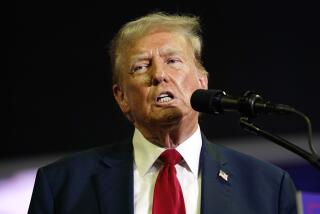Lawyer in King Case to Appeal Gag Ruling
- Share via
The defense lawyer for one of four police officers charged with violating Rodney G. King’s civil rights said Friday that a gag order that prevents him from impugning the motives of prosecutors in the case is illegal and that he will appeal it.
“I think it’s an illegal order,” said Harland W. Braun, who represents Officer Theodore J. Briseno. “It seems to me critical that defense lawyers be allowed to criticize the government. Who knows better?”
That opinion was echoed by Paul Hoffman, legal director for the Southern California American Civil Liberties Union. Hoffman said the ACLU was considering joining with Braun in appealing the order, imposed by U.S. District Judge John G. Davies on Thursday.
“My view is that the order is at odds with the 1st Amendment,” Hoffman said. “The issue of the government’s motivation in bringing this prosecution is being discussed all across the country. The notion that Harland Braun should not be allowed to participate in that debate is not appropriate. It makes no sense.”
Judge Davies imposed the gag order after finding that “there is a substantial probability that continued inflammatory comments by Mr. Braun will jeopardize the fairness of the trial.”
Davies was particularly incensed by statements in which Braun said he believed that it might be difficult to find impartial African-Americans to serve on the jury. Although Braun said that “as a member of society, I want a mixed jury,” he also warned that prospective jurors who were black might be more likely to be intimidated about voting not guilty.
During last year’s state trial, every prospective black juror said he or she would find it impossible to be impartial. As a result, the jury selected did not include any African-Americans.
Braun said in a number of interviews that he believed that the same thing might happen in the federal trial. His comments drew fire from political officials and even from some of his colleagues in the case. Ira Salzman, the lawyer for Sgt. Stacey C. Koon, called Braun’s remarks “irresponsible and offensive” and applauded Davies for imposing the gag order.
During court appearances and in interviews, Braun also has accused the government of waging a politically motivated prosecution, and he has said that government lawyers are part of the “mob” trying to convict the four officers.
Shortly after the judge imposed the order, Braun called the prosecutors “wonderful guys,” adding, “It was really nice of them to indict my client. In fact, my client wants to know their address so that he can send them a thank-you letter.”
In an interview Friday, Braun stressed that he will obey the judge’s order but said he hopes that a higher court will overturn the portion of it that prevents him from criticizing the motives of the government or prosecutors. Braun said he will not appeal the prohibition on comments regarding the jury.
Hoffman applauded Braun for agreeing to suspend discussion of the jury and said he understood Davies’ concerns about pretrial publicity.
But Hoffman added that even though the ACLU disagrees with Braun’s contention that the prosecution is politically motivated, he believes that Braun should be allowed to express his views.
Legal experts warned that although lawyers have a right to express their views in public, they also are bound by their duties as officers of the court. Norman Garland, a law professor at Southwestern University School of Law, said the order was unusual but added that the judge may be able to justify such a step in order to protect the fairness of the trial.
Peter Arenella, a law professor at UCLA, agreed. But he added that the chances did not appear great that comments about prosecutors or the government were likely to taint a jury: “I frankly don’t think there’s a very strong case for that.”
Meanwhile, lawyers for The Times and the Associated Press formally notified the court Friday that they will appeal another of Davies’ orders in which he prohibited completed juror questionnaires from being released, even without the jurors’ names.
More to Read
Sign up for Essential California
The most important California stories and recommendations in your inbox every morning.
You may occasionally receive promotional content from the Los Angeles Times.














